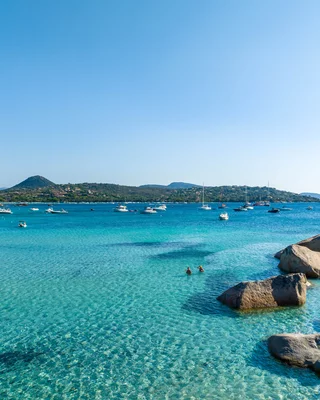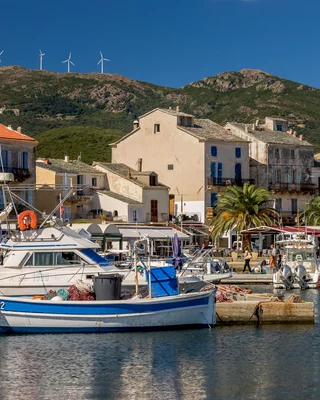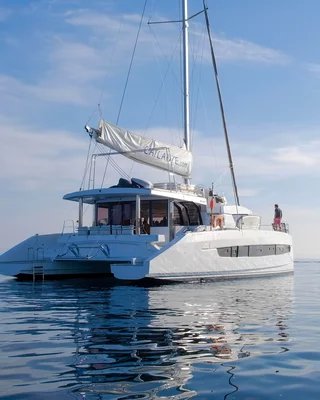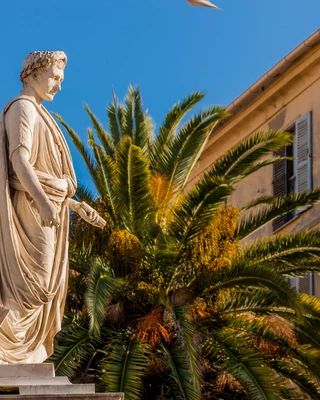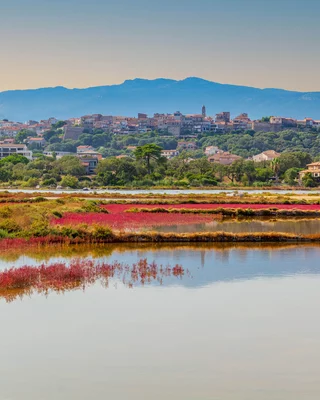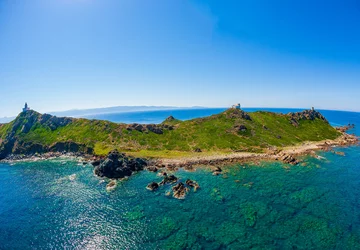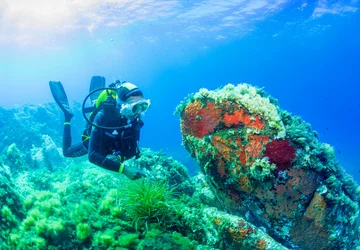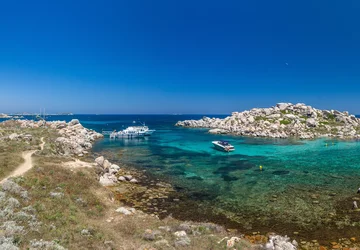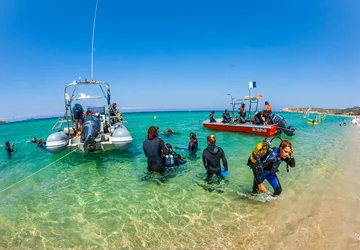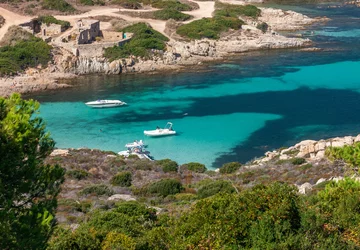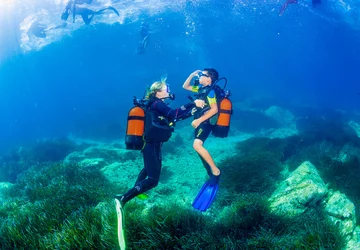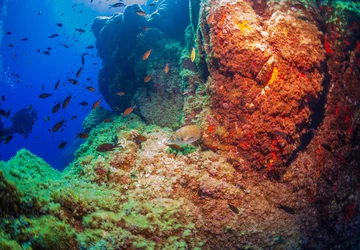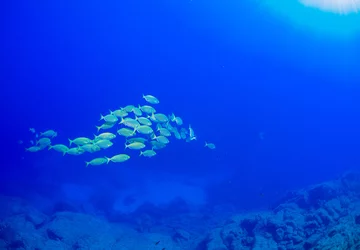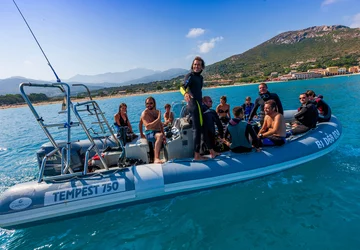Corsica's most beautiful diving spots
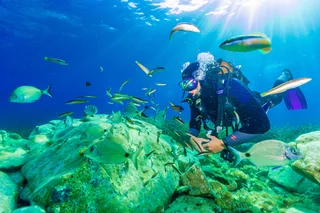
Are you dreaming of diving during your trip to Corsica this summer? An unspoilt island in the heart of the Mediterranean, Corsica boasts a varied landscape with rugged cliffs and wild charm. Home to a wide variety of protected underwater fauna, the island's rich and varied seabed is a veritable natural sanctuary, untouched by pollution. The quality and diversity of its spots (around a hundred) make Corsica THE ideal diving destination for professionals and amateurs alike.
Plan your customized trip now
Where to dive in southern Corsica?
Diving center near the Scandola nature reserve
The Scandola nature reserve, located in the Gulf of Girolata and Porto, is the ideal spot to explore the magnificent underwater world! Diving is forbidden in the reserve, but it is possible along its borders. Considered one of Corsica's best diving spots, you'll discover a biodiversity as rich as it is astonishing: nudibranchs, red gorgonians, schools of crayfish, groupers, moray eels... In the Calanques de Piana (UNESCO World Heritage site), impressive drop-offs await you at the Ficajola site. Other spots to discover near the reserve include Vardiola, Sec de Senino, Pointe de Scopa, Punta Munchillina and Monte Rosso.
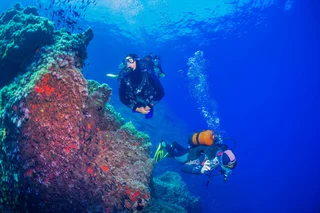
Diving in Sagone Bay
The Bay of Sagone offers a variety of dive sites for beginners and experienced divers alike! The magnificent seabed includes a Canadair wreck, an impressive 60-metre drop-off (Punta Locca) and the rare Pinna Nobillis, a large mother-of-pearl found at the Calderas de Marifaja site at a depth of 27 metres. Capo Rosso and Banc Provençal, on the other hand, are for experienced divers. Continue your exploration near Cargèse and along the Valinco and Lava bays! You'll come across schools of drumfish, large groupers, barracudas and rock cod.
Diving clubs in Ajaccio Bay
Located on the coast of the Tyrrhenian Sea, Ajaccio offers diving all year round. It boasts a rich seabed with a magnificent mosaic of colors. In a unique atmosphere, you'll discover the wreck of the Alcione, a 24-metre Italian tanker torpedoed in 1943! At Campanina, you can explore a large cavern, home to king sea bream. Don't hesitate to head to Porticcio to explore the nearby reefs. A rich and dense fauna awaits you to make your dives unforgettable! Scuba, the Merous valley, the Tino drop-off... Let yourself be seduced by the beauty of this mysterious world.
Scubadiving in Propriano Bay
Whether you're a beginner or an intermediate diver, Propriano Bay in the Gulf of Valinco offers a variety of drift and deep dives. There's something for everyone! Dive sites offering excellent visibility at depths of up to 25m are located near the village of Campomoro. Among the spots to explore: the Pyramides underwater tunnel (45m deep), the Jardin underwater tunnel with its astonishing black coral, the Vallée des mérous and the Aiguilles site's famous driers.
Diving in Saint Cyprien Bay, Porto-Vecchio
Located in Lecci, the Bay of Saint Cyprien offers fabulous diving! You can also extend your explorations off Porto Vecchio, to discover strange and impressive spiral-shaped rocks and spectacular scenery with fish-filled canyons, shipwrecks and underwater arches.
Snorkeling in Bonifacio on the Lavezzi Islands
Just 10 km from Bonifacio, reach one of Corsica's most beautiful snorkeling spots in the Lavezzi Islands nature reserve. If paradise exists, it's here: you don't have to dive very deep to enjoy the spectacle offered by the 6 islands and their transparent waters! You can go to the sec de Pelu: "Mérouville", which is the sanctuary of brown groupers accustomed to receiving visits from divers, and which will be delighted to approach you for a nice photo.
Where to dive in Haute-Corse
Diving in Balagne
Head for Calvi, where beautiful white sandy beaches and turquoise waters invite you to relax and enjoy unforgettable scuba diving! Located just outside the Revellata nature reserve, the dive sites of Saint François, Sec des Belges and à la Bibliothèque offer great diving spots. The Revellata peninsula, facing the citadel of Calvi and its many geological curiosities, offers breathtaking diving through canyons, tunnels and caves where tuna sometimes roam. For the more experienced, come and discover the wreck of the B-17, (32 m long and 23 m wingspan), located at 28 meters, which had to ditch during the Second World War.
On Île Rousse (to the north), the sites of Le Brocettu and NASO are a must. For a spot of snorkeling, head for a cove on the Ile de Pietra, where wrasse, sea urchins and sea anemones await you.
Diving in the Cap
In the Cap Corse region, there are a number of superb dive sites: the Giraglia Island, with its gentle slope for moray eels and lobsters, the Tour Sainte Marie for spider crabs, and plane and ship wrecks.
Where to go diving in Corsica?
Throughout Corsica, you'll find passionate professionals eager to help beginners and initiates alike discover the island's most beautiful spots. Choose adivingcenternear your vacation destination and talk to the instructors who will be on hand to help you with your first dive. You'll have no trouble choosing a friendly, family-run club that combines good humor with safety.
The best time to dive in Corsica is between May and October, when air and water temperatures are ideal for scuba diving and snorkeling. For a more leisurely exploration, we advise you to book your dates between May and June. It's a time when the crowds are smaller and you can enjoy the pleasures of the sea to the full!
In Haute Corse or Corse du Sud, there's no shortage of diving spots on the Isle of Beauty. It all depends on what you want to discover and how long you want to stay. However, some sites are reserved for experienced divers, and if you'd like to discover them as a family, the Bay of Saint Cyprien is a good choice. Many diving clubs offer introductory diving courses for children and beginners.
Preparing your stay
Because the seabed is protected from pollution, remember to use biodegradable sunscreen. You'll be helping to protect marine flora and fauna.
Finally, if you have to drive back up to an altitude of over 300m, we recommend you wait at least 12 hours if you've done a single dive, and 18 hours if you've done several dives, to avoid feeling unwell en route.

- Cicada de mer (Scyllarides latus)
- Cicada de mer (Scyllarides latus)
- Sea date (Litophaga lithophaga)
- Great mother-of-pearl (Pinna nobilis)
- Black grouper (Epinephelus guaza)
- Sea urchin (Centrostephanus longispinus)
- Giant limpet (Patella ferruginea)
- Posidonia oceanica (Posidonia oceanica)
- Sea turtle (Caretta caretta)
- As well as all marine mammals.
